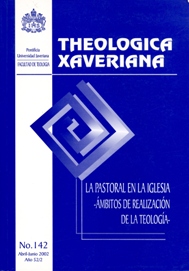Abstract
El artículo recoge diversas inquietudes sobre la identidad del diaconado permanente en las iglesias, y resalta su carácter de ministerio de unidad (dimensión jerárquica) orientado primordialmente a la dimensión social. Esta visión se contrapone a la de un superministro que absorbe diversos ministros y llega a ser un ayudante cualificado de la pastoral parroquial. Se mencionan experiencias de otras iglesias cristianas, en especial, del norte de Europa. Se trata de invitar a una reflexión sobre el carácter mismo del diaconado y las implicaciones de su restauración para la visión ministerial de la Iglesia.This journal is registered under a Creative Commons Attribution 4.0 International Public License. Thus, this work may be reproduced, distributed, and publicly shared in digital format, as long as the names of the authors and Pontificia Universidad Javeriana are acknowledged. Others are allowed to quote, adapt, transform, auto-archive, republish, and create based on this material, for any purpose (even commercial ones), provided the authorship is duly acknowledged, a link to the original work is provided, and it is specified if changes have been made. Pontificia Universidad Javeriana does not hold the rights of published works and the authors are solely responsible for the contents of their works; they keep the moral, intellectual, privacy, and publicity rights.
Approving the intervention of the work (review, copy-editing, translation, layout) and the following outreach, are granted through an use license and not through an assignment of rights. This means the journal and Pontificia Universidad Javeriana cannot be held responsible for any ethical malpractice by the authors. As a consequence of the protection granted by the use license, the journal is not required to publish recantations or modify information already published, unless the errata stems from the editorial management process. Publishing contents in this journal does not generate royalties for contributors.


